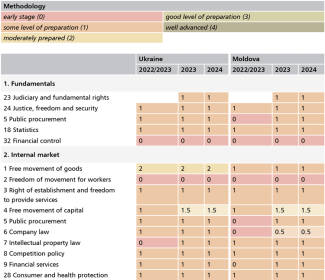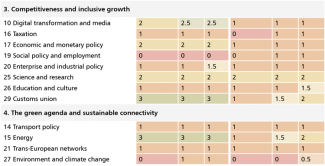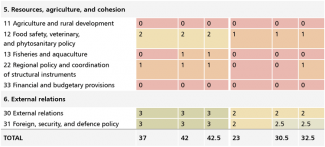A window with a view of membership: Ukraine’s and Moldova’s progress on the path to the EU

On 30 October, the European Commission published its annual enlargement reports containing a detailed assessment of the state of play and the progress made by the countries seeking to join the European Union, including Ukraine and Moldova. The documents are divided into thematic sections corresponding to six clusters encompassing a total of 33 negotiation chapters.
The assessment of both countries is fundamentally positive. Regarding Ukraine, the report highlighted that, despite the Russian invasion, the country has shown “remarkable resilience and commitment to its European path”. In regard to Moldova, attention was drawn to its steady progress despite “unprecedented challenges” resulting from Moscow’s intensified hybrid actions intended to destabilise the country. In the European Commission’s view, Kyiv and Chișinău are at a similar stage of accession preparations (see Appendix), and the progress made over the past year enables them to open the first cluster (as well as other clusters) in 2025. Both capitals hope that Poland’s presidency of the EU Council in the first half of 2025 will further facilitate these efforts.
“Some progress” achieved by Ukraine in wartime conditions
In the first and most significant cluster, which pertains to the so-called fundamentals – including the rule of law, democratic institutions, and the judiciary – and is the first to be opened at the start of accession negotiations and the last to close, Ukraine has achieved “some” progress in three of the five chapters and “limited” progress in two . Kyiv’s readiness for accession, in terms of harmonising national law with EU law, was assessed as showing “some level of preparation” in four chapters and being at an “early stage” of preparation in one chapter.[1]
These assessments enabled the European Commission to conditionally recommend opening the first cluster, as well as other clusters, as early as the first half of next year. This development is in line with the expectations of the Ukrainian authorities. Ukraine’s Foreign Minister, Andriy Sybiha, stated that Kyiv hopes to see the opening of two negotiation clusters during Poland’s presidency. According to the minister, discussions regarding another cluster (the specifics of which he did not disclose) would proceed in parallel rather than “one by one”.[2]
The European Commission’s report noted that under the conditions of martial law in Ukraine, some rights and freedoms have been restricted, but the measures taken were proportional and justified. The report also highlighted that the Verkhovna Rada of Ukraine continues to perform its legislative function, and adopts its key decisions – especially those regarding defence and security – by a clear, cross-party majority. However, the report emphasised the necessity to expand parliamentary oversight of government actions, particularly by enhancing the opposition’s role in monitoring the drafting and adoption of legislation. Concerning the restrictions imposed by the Verkhovna Rada leadership on the foreign travel by opposition deputies, the European Commission merely stressed the importance of maintaining “space for political dialogue”, including internationally.
The report welcomed the establishment of institutions responsible for EU integration and their active involvement in the ongoing screening process (a review of legislation for compliance with EU laws). This process is supervised by the Government Office for Coordination of European and Euro-Atlantic Integration, led by Deputy Prime Minister Olha Stefanishyna. Since June, she has also served as the head of Ukraine’s negotiating team, and as of September, she also holds the position of Minister of Justice. Her appointment to these roles demonstrates the Presidential Office’s acknowledgment of her prior achievements. Under Stefanishyna’s leadership, the Ministry of Justice is expected to undergo comprehensive reform to align its operations with EU requirements as swiftly as possible. This move is intended to signal to European partners that Ukraine is prioritising EU integration. However, entrusting such extensive responsibilities to a single individual underscores the country’s limited cadre of qualified personnel and raises concerns about the timely and effective implementation of all assigned tasks.
Judicial reforms, anti-corruption measures, and respect for fundamental rights were assessed as moderately positive, with Ukraine demonstrating “some level of preparation” and achieving “some progress” in these areas. The European Commission highlighted issues such as vacancies in the High Council of Justice, which oversees judicial appointments and discipline, and in the Constitutional Court. In the latter institution the situation is particularly urgent, as the court currently comprises 14 judges, three of whom will complete their nine-year terms in January 2025. Further delays in reforming this body could result in operational paralysis, as its decisions require the presence of at least 12 members from its full complement of 18 justices to be valid. Despite staffing and financial challenges, the European Commission noted that “most courts in Ukraine maintained a high degree of efficiency”.
Progress in the fight against corruption was assessed positively in the report, which noted that the competent bodies in this area – the National Anti-Corruption Bureau of Ukraine (NABU) and the Specialised Anti-Corruption Prosecutor’s Office (SAPO) – have maintained their operational effectiveness and remain key institutional pillars of the state.
The European Commission’s assertion that Ukraine has fulfilled the Venice Commission’s recommendations regarding the protection of the rights of national minorities is an important conclusion in the context of disputes between Kyiv and Budapest.[3] Alongside this, the European Commission recommended implementing the provisions of the Istanbul Convention, which was ratified in 2022, improving the system of support for persons with disabilities, and increasing the number of investigations into instances of torture and ill-treatment in places of detention.
In regard to freedom of expression, the report stated that Ukraine “is between having some level of preparation and a moderate level of preparation” and that it has made “some progress” in this area. The limits on freedom of expression have long been criticised by Ukrainian journalists and the opposition due to an effective monopolisation of television broadcasting by the government through the so-called telemarathon launched in March 2022. This telemarathon is a joint broadcast across several channels featuring almost exclusively government representatives. Although Kyiv was not accused of restricting freedom of expression, the fact that the report highlighted instances of pressure on journalists and expressed concern about the format of the telemarathon’s broadcasting can be regarded as a warning sign to policymakers. Further attempts to restrict the opposition’s access to the media under the pretext of combating Russian disinformation could raise the European Commission’s concerns about the state of the rule of law and democracy in Ukraine.[4] Kyiv received relatively high scores in areas reformed in recent years under the implementation of the Association Agreement and the Deep and Comprehensive Free Trade Area (DCFTA), as well as in preparations for signing the Agreement on Conformity Assessment and Acceptance of Industrial Products (ACAA). These areas pertain to Ukrainian companies’ access to the EU market, particularly in chapters on the free movement of goods, economic and monetary policy, food safety, veterinary and phytosanitary policy (where progress was assessed as moderate), digital transformation (rated between moderate and good), and the customs union (good level of preparation).
At the same time, Kyiv faces challenges in aligning with EU standards while adopting legislation intended to harmonise laws related to market economy principles. The process of reforming the state in this area was assessed as showing “some progress”, while the overall level of preparation was evaluated as being between an “early stage” (the lowest level) and “some level of preparation”.
Moldova’s progress and shortcomings
In the section of the report addressing the fundamentals, the European Commission generally assessed Moldova’s democracy positively. However, it highlighted instances where the authorities have employed controversial measures that do not align with international standards. One such example was the decision on 5 November 2023 to remove the Chance party, linked to Ilan Șor – a Moldovan oligarch sentenced to 15 years in prison for his role in the 2014 theft of $1 billion from local banks and now in hiding in Russia – from electoral lists. While the removal itself was not contested, as it was justified by the party’s receipt of funding from Russia, the European Commission criticised the timing, which came two days before local elections. The report also urged Chișinău to expand the process of public consultations when drafting legislation – a concern frequently raised by representatives of Moldova’s third sector. Another significant issue highlighted was the still-unimplemented local government reform.
The European Commission highlighted significant progress in an area where the authorities in Chișinău had previously struggled the most to implement reforms, namely the judiciary. It particularly commended the ongoing vetting process of judges and prosecutors, which began in 2022, as well as the related reappointment of officials to positions in key judicial institutions. The composition of the Superior Council of Prosecutors (CSP) and the Superior Council of Magistracy (CSM) has already been revised (with one position still vacant in the CSM), and both institutions are now fully operational.
After three years, in June 2024, a new Prosecutor General was appointed, replacing the interim arrangements that had been in place since the dismissal of Alexandr Stoianoglo in 2021. Despite the positive assessment of progress in the vetting process, the report emphasised the need for its continuation, particularly the urgent restoration of the Supreme Court’s operations, where the staffing process has only recently commenced. Moreover, the European Commission has called on Chișinău to improve the efficiency of the judiciary, particularly by reducing the duration of legal proceedings.
Attention was also drawn to the ineffectiveness of anti-corruption proceedings, which rarely result in convictions. The European Commission urged the Moldovan authorities to enhance coordination between the two key institutions responsible for combating corruption: the National Anti-Corruption Centre (CNA) and the Anti-Corruption Prosecution Office, which in recent months have competed with each for oversight of significant investigations.
Surprisingly, the report took a critical stance on Chișinău’s progress in ensuring citizens’ right to freedom of expression. While the situation in Moldova in this regard is not entirely negative – the European Commission acknowledged “some progress” and “some level of preparation” – it highlighted areas of concern. For instance, the authorities have made limited efforts to improve the protection of journalists, who continue to face intimidation, with relevant bodies often failing to address the issue effectively. The report also stressed that measures to counter Russian hybrid activities in the media sphere must comply with international standards. This appeared to criticise the government’s handling of its 2024 decision to suspend the licences of five television stations linked to Russia or accused of spreading Russian propaganda, rather than the decision itself.
The key issues and shortcomings highlighted in the remaining sections of the report relate to the economy and the financial sector. The authors observed limited progress in preparing the country to function under the conditions of free competition within the EU’s single market. The European Commission had doubts regarding the independence of the National Bank of Moldova following the 2023 dismissal of its previous governor by parliament. Delays were also recorded in implementing regulations regarding standardisation and competition protection.
The fundamentals are a priority
In most chapters of the report concerning Ukraine, the EU assessed its progress as “some level of preparation” (18 chapters, particularly in clusters regarding the fundamentals, the internal market, as well as the green agenda and sustainable connectivity) or as being at an “early stage” (including chapters on financial control, freedom of movement for workers, social policy and employment, agriculture and rural development, and financial and budgetary provisions). A “good level of preparation” was noted only in chapters addressing energy and external relations.
In the period analysed in the report, Kyiv achieved “some progress” in 17 chapters and was found to be “moderately prepared” in nine chapters. This indicates that its general level of preparation for accession talks remains relatively low, especially in the most sensitive areas from the perspective of the interests of specific member states (agriculture, employment, financial control, as well as financial and budgetary provisions). However, this situation stems less from a lack of determination on the part of the Ukrainian authorities and more from the fact that the accession talks are still in their early stages, having only begun in June this year when the EU Council adopted a Negotiating Framework for Ukraine and Moldova.[5]
In addition, Kyiv’s assessment was also influenced by its recent focus on the screening of issues addressed in the first cluster. On 13 November, Stefanishyna announced the completion of this process and indicated that a European Commission report outlining the conditions for opening negotiations in this area is expected within the next six weeks. Kyiv is hoping that this will happen as early as the beginning of 2025, during the Polish presidency. The report’s positive assessment regarding the rights of national minorities has facilitated progress in this respect, removing substantive (though not political) grounds for Budapest to continue obstructing Ukraine’s integration process.
The Moldovan authorities are determined to conduct accession talks as swiftly as possible, due to Chișinău‘s aim to begin closing individual negotiation clusters by 2027. However, the inefficiency of the country’s administration may prevent this, primarily due to understaffing. Moldova’s representative office in Brussels employs fewer than 10 individuals, and the chief negotiator – Deputy Prime Minister for European Integration, Cristina Gherasimov – leads a small team. However, the further progress of negotiations with the EU will largely depend on the country’s internal political situation, particularly the outcome of the parliamentary election scheduled for mid-2025 and the composition of the next government.[6]
APPENDIX
Assessment of Ukraine’s and Moldova’s preparedness for EU integration as presented in European Commission reports 


Source: Scorecard 2024 - What the Commission assessments reveal, European Stability Initiative, 31 October 2024, esiweb.org.
[1] In each of the clusters, the current level of preparedness was accessed according to the following scale: early stage, some level of preparation, moderately prepared, good level of preparation, and well advanced. To assess progress made in the period analysed in the report, the following scale was used: backsliding, no progress, limited progress, some progress, good progress, and very good progress.
Some instances have been classified as intermediate stages and the European Commission’s assessments are followed by recommendations and guidelines regarding the most important reforms.
[2] ‘Україна готова паралельно відкривати два переговорні кластери з ЄС на початку 2025 року’, Інтерфакс-Україна, 13 November 2024, interfax.com.ua.
[3] M. Jędrysiak, K. Nieczypor et al., ‘Ukraine: another amendment to the law on national minorities’, OSW, 13 December 2023, osw.waw.pl.
[4] One example of this involves complaints by one of Ukraine’s leading news websites regarding pressure from the Office of the President of Ukraine. See M. Jędrysiak, ‘The Ukrainian government’s systematic pressure on the media’, OSW, 15 October 2024, osw.waw.pl.
[5] K. Nieczypor, A. Sadecki, M. Szpala, ‘Ukraine opens accession negotiations with the EU’, OSW, 26 June 2024, osw.waw.pl.
[6] K. Całus, ‘Moldova: diaspora votes propel Maia Sandu to re-election’, OSW, 4 November 2024, osw.waw.pl.




